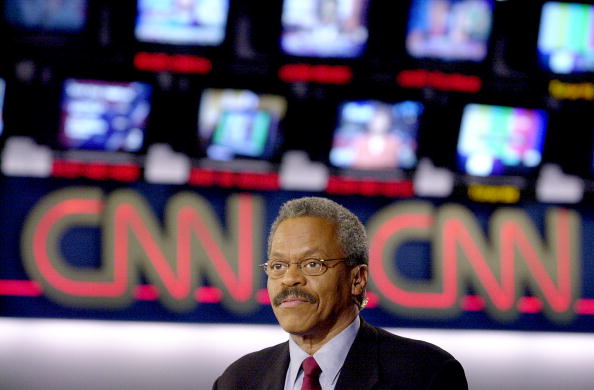Bernard Shaw, Legendary CNN Anchor And Pioneering Black Journalist, Dies At 82
CNN anchor Bernard Shaw pictured in 2000 in Atlanta. | Source: Erik S. Lesser / Getty
Bernard Shaw, a veteran journalist and award-winning cable news anchor whose unwavering command of current events helped open doors for other Black broadcast journalists, died Thursday morning at the age of 82. His followed complications from pneumonia that were not related to COVID-19, Shaw’s family said in a statement.
Shaw, who rose to journalistic prominence as the face of CNN for more than 20 years after becoming one of the then-upstart network’s first news anchors, gained the collective trust of America as he reported on myriad history-making moments in the U.S. as well as around the world. His death was first reported by CNN.
RIP Bernard Shaw. pic.twitter.com/6bN3FfGhHh
— a. rye (@angela_rye) September 8, 2022
From covering the Gulf War in Iraq to moderating high-profile political debates between candidates running for the executive branch of the U.S. government, Shaw and his legendary career as CNN’s first chief anchor made him a household name from the time he began working at the network in 1980 until he retired in 2001.
“Even after he left CNN, Bernie remained a close member of our CNN family providing our viewers with context about historic events as recently as last year,” Chris Licht, CNN Chairman and CEO, said in a statement Thursday.
Working his way up from a news reporter for a Chicago radio station to a White House correspondent before becoming an ABC News correspondent based in Latin America, Shaw carved out an enviable career in journalism that ultimately helped him land the coveted anchor position at CNN from its humble beginnings more than 32 years ago.
Despite all of his accolades — including his notable win of a lifetime achievement award from the National Association of Black Journalists –, Shaw may be most widely known for moderating the presidential debate between then-Republican Vice President George H.W. Bush and Democrat Michael Dukakis of Massachusetts in 1988.
In particular, Shaw’s first question of the debate cause quite the stir at the time when he hypothesized whether Dukakis’ opposition to the death penalty would change if his wife was “raped and murdered.” Shaw asked: “Would you favor an irrevocable death penalty for the killer?”
From Second 1988 Presidential Debate
Bernard Shaw: “Governor, if Kitty Dukakis were raped and murdered, would you favor an irrevocable death penalty for the killer?”
Dukakis: “No, I don’t, Bernard. And I think you know that I’ve opposed the death penalty during all of my life.” pic.twitter.com/9uejVOJupe
— CSPAN (@cspan) September 8, 2022
That debate and line of questioning, however, was far from the so-called defining moment of Shaw’s career. Aside from having moderated the vice-presidential debate between Dick Cheney and Joe Lieberman in 2000, Shaw led CNN’s news coverage of such historical events as the student revolt in Tiananmen Square in 1989, a devastating 6.7 magnitude earthquake in California in 1994 and Princess Diana’s death in 1997.
But it was Shaw’s reporting in Iraq during the Persian Gulf War that seemingly solidified his place in journalism’s hallowed hall of fame. He and other journalists covering the war became known as “The Boys of Baghdad,” a designation he once spoke of in fatal terms.
“In war, one moment you’re alive, the next moment you’re dead, and I made my peace with the fact that at any moment I could die, and I just decided to focus on doing my job,” Shaw said 12 years after the Gulf War began.
Just nine months after CNN launched the nation’s first 24/7 cable news network, Bernard Shaw anchored the network’s live coverage of the assassination attempt on President Reagan. pic.twitter.com/GW4MBPkovb
— Keith Boykin (@keithboykin) September 8, 2022
Shaw also addressed the apparent conflict of interest with journalists covering wars while being embedded with U.S. troops.
“The idea of journalists allowing themselves to be taken under the wing of the United States military to me is very dangerous,” Shaw added during a CNN interview in 2003. “I think journalists who agree to go with combat units effectively become hostages of the military, which can control the movements of the journalists and more importantly control their ability when they file their stories.”
By that same token, Shaw opined, “the military should not be concerned about the safety of journalists. That’s not their mission.”
“Here are some reasons why Iron Fist did not come down two weeks ago, three weeks ago: The expanded presence of army of international reporters welcomed into China to cover the summit”#RIP Bernard Shaw from June 7, 1989, remarks about Tiananmen Square protests at @PressClubDC pic.twitter.com/ECUi1bcCNi
— Howard Mortman (@HowardMortman) September 8, 2022
Following his retirement, Shaw remained sporadically active in journalism, including occasionally hosting or appearing on CNN shows. But he said he wanted to spend more time with his family in retirement, and by all accounts, that’s exactly what happened.
Shaw is survived by his wife, Linda Allston, to whom he was married for nearly 50 years, and their two adult sons.
This is a developing story that will be updated as additional information becomes available.
SEE ALSO:
The Historic Career Of Max Robinson: The First Black News Anchor
Oakland’s Finest: The Meteoric Rise Of Malika Andrews
The post Bernard Shaw, Legendary CNN Anchor And Pioneering Black Journalist, Dies At 82 appeared first on NewsOne.

